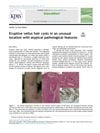10 citations,
June 2015 in “Seminars in cutaneous medicine and surgery” Hair loss can be caused by various factors, and treatments focus on restoring normal hair growth.
 2 citations,
November 2003 in “Humana Press eBooks”
2 citations,
November 2003 in “Humana Press eBooks” Hair follicle cells can help heal wounds and study skin diseases.
Melatonin shortens the hair growth cycle by increasing PDGFA gene expression.
 October 2003 in “Journal of the Royal Society of Medicine”
October 2003 in “Journal of the Royal Society of Medicine” The book is a detailed guide on hair diseases and diagnosis, useful for skin disease experts.
GHK-Cu and propolis may help prevent scalp aging and hair loss.
September 2020 in “International journal of current pharmaceutical research” Tea tree oil cream effectively reduces hair growth.
34 citations,
January 2013 in “Frontiers in genetics” Stem cells can help other stem cells by producing supportive factors.
 September 2020 in “Research Square (Research Square)”
September 2020 in “Research Square (Research Square)” Researchers found that certain RNA sequences play a role in yak hair growth and these sequences are somewhat similar to those in cashmere goats.
 23 citations,
April 1999 in “Dermatologic Clinics”
23 citations,
April 1999 in “Dermatologic Clinics” Pulsed-intense light can significantly reduce hair, with effectiveness depending on treatment number and timing, and has mild side effects.
 January 2018 in “The Kaohsiung journal of medical sciences”
January 2018 in “The Kaohsiung journal of medical sciences” A young man had a rare case of hair cysts on his elbows, which was hard to diagnose and treat.
 January 2018 in “bioRxiv (Cold Spring Harbor Laboratory)”
January 2018 in “bioRxiv (Cold Spring Harbor Laboratory)” Researchers found key regions in the mouse hairless gene that control its activity in skin and brain cells, affecting hair follicle function.
January 2011 in “The Chinese Journal of Dermatovenereology” Curcuma anti-acne gel effectively reduces acne symptoms.
January 2003 in “Journal of the Fourth Military Medical University” Hair follicles can regenerate if cut at certain points, with stem cells in the upper part.
108 citations,
October 2003 in “Journal of biological chemistry/The Journal of biological chemistry” Trichohyalin makes hair follicles stronger.
1 citations,
April 2022 in “Journal of Ayurveda and integrative medicine” Blumea eriantha DC extract shows strong potential for promoting hair growth.
26 citations,
July 2006 in “International Journal of Cosmetic Science” Taurine helps protect and promote hair growth.
 May 2017 in “Journal of The American Academy of Dermatology”
May 2017 in “Journal of The American Academy of Dermatology” LED light helps human hair root cells grow and prevents them from dying by activating specific growth pathways.
 March 2023 in “Advances in Cosmetic Surgery”
March 2023 in “Advances in Cosmetic Surgery” Exosomes, tiny cell-released particles, may help hair growth, but their exact role is unclear, they're not FDA-approved, and their unregulated use can cause side effects.
27 citations,
July 1997 in “PubMed” The harlequin ichthyosis mouse mutation causes thick skin and early death, resembling a human skin disorder.
1 citations,
October 1996 in “Dermatologic clinics” Adiponectin reduces inflammation and bone loss in joint replacements.
 3 citations,
May 2011 in “International Journal of Dermatology”
3 citations,
May 2011 in “International Journal of Dermatology” Using an epidural needle in hair restoration surgery can reduce grafts popping out, make the procedure easier, and result in natural-looking hairlines without obvious scarring.
 28 citations,
January 2007 in “Dermatology”
28 citations,
January 2007 in “Dermatology” Chemotherapy can cause rapid, extensive hair loss, with patterns varying between individuals.
 April 2021 in “Current Topics in Nutraceutical Research”
April 2021 in “Current Topics in Nutraceutical Research” Citron seed oil may help prevent or treat hair loss by promoting hair growth and increasing hair density.
2 citations,
February 2024 in “Toxins” Bee venom can help stem cells promote hair growth.
9 citations,
January 2015 in “Springer eBooks” Using hair follicles can improve skin drug delivery.
 47 citations,
September 2015 in “Cell Cycle”
47 citations,
September 2015 in “Cell Cycle” Different skin stem cells help heal wounds, with hair follicle cells becoming more important over time.
32 citations,
June 2021 in “Frontiers in Pharmacology” The hydrogel speeds up burn wound healing and promotes tissue regeneration.
 1 citations,
March 2023 in “Clinical, Cosmetic and Investigational Dermatology”
1 citations,
March 2023 in “Clinical, Cosmetic and Investigational Dermatology” Current treatments for Alopecia Areata have mixed success, and there's a need for better, more accessible options and support for affected individuals.
 11 citations,
August 2013 in “International Journal of Cosmetic Science”
11 citations,
August 2013 in “International Journal of Cosmetic Science” The study suggests that a new protease inhibitor can make hair harder to pull out, potentially reducing hair loss.
13 citations,
October 2010 in “Methods in molecular biology” Hair follicle culture helps study cell interactions and effects of substances on tissue growth.













